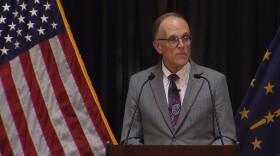Since he first attended the Kentucky Center Governor’s School for the Arts (GSA) in 2002, the program has been a pretty consistent part of Nick Covault’s life.
“When I attended GSA for vocal music, it was the first time somebody really looked me square in the eye and told me I was an artist,” Covault says. “That it was a good thing, and that it was something that could continue to be a great presence in my life.”
Covault went on to spend three summers at GSA as an administrative intern while he was pursuing a double major in vocal music performance and arts administration at the University of Kentucky; he is now the first GSA alum serving as the director of the program -- a position he took in November.
“And I really hope that my perspective as an alum of the program can help me make that much more impact for the students across the state of the Kentucky,” he says.
As the Jan. 15 application deadline approaches, here are some of the things Covault wants perspective attendees to know about the program:
What exactly is GSA?
Each summer, The Kentucky Center Governor’s School for the Arts takes place at Danville’s Centre College from mid-June to early July. During their three-week stay, student artists from dozens of counties are immersed in a rigorous schedule of daily seminars, master classes, lectures, hands-on workshops and field trips to regional arts attractions.
Instruction is offered in nine disciplines: Architecture and Design, Creative Writing, Dance, Drama, Instrumental Music, Musical Theater, New Media, Visual Art and Vocal Music.
Since 1987, more than 5,500 high school sophomores and juniors have attended the GSA summer program. Twenty-seven colleges and universities currently offer scholarships to program alumni.
If I’m not sure I want to be a professional artist, can I still apply?
According to Covault, there is a joke at GSA that also holds a tremendous amount of truth: students leave GSA either really wanting to pursue their art form as their career, or realizing they don’t.
“And no matter what, they have had a positive experience at GSA that has helped them get to that point,” Covault says. “I think one of the most important things that we teach at the Governor’s School for the Arts is that by being a creative person you have this unique skill that you can utilize to change the world in your own unique ways.”
Covault says for some people that will mean becoming the next Broadway star, for others it might mean keeping up their art form in addition to a day job, and for some it might mean taking the creativity and problem-solving skills they learned at GSA to affect the community in different ways.
“It is important to be honest with these students that being a creative person doesn’t mean becoming a professional artist,” Covault says. “And being an artist doesn’t mean you do art all day long for your day job.”
What is the application process like?
“First of all, I really encourage students, parents, teachers, friends of people who might be interested in applying to go check out our website,” Covault says. “There is a lot to dig into there about what the summer program looks like.”
GSA has moved to a virtual adjudication process where students submit their auditions or artwork online. From that pool, finalists are selected to come for an in-person interview in late March. About 250 high school juniors and seniors are selected.
How would you recommend I prepare for the application process?
“The most important thing that I can think to recommend for you is to just keep working on your craft -- if it is drawing, singing, dancing, writing,” Covault says. “Keep working on that as often as you can, develop your passion for it, understand why it is important to you, really be able to talk about.”
Covault also recommends that students talk with family members, art instructors and other teachers.
“I think students are often surprised by the number of resources in their communities,” he says.
Students are also encouraged to call the GSA help-line, which is listed on their website. Additionally, each fall, GSA hosts Art Shops all across the state which are audition and portfolio preparatory sessions.




